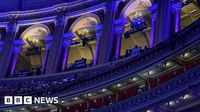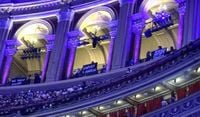The storied Royal Albert Hall in London is no stranger to drama, but on the evening of August 29, 2025, the excitement was less about the music and more about the message. Just as the Melbourne Symphony Orchestra (MSO) lifted their bows for a highly anticipated BBC Proms performance under the baton of Jaime Martin, the concert hall was jolted by an unexpected interruption: pro-Palestinian protesters, banners unfurled, voices raised, and a live broadcast suddenly thrown into chaos.
According to BBC and multiple eyewitness accounts, several protesters stood up in the upper gallery as the first notes rang out, holding black, handwritten fabric signs bearing stark messages: “complicit in genocide” and “Jewish Artists For Palestine.” The disruption wasn’t just seen by the audience—it was heard across the airwaves, as BBC Radio 3 was broadcasting the event live. The broadcast quickly cut away to pre-recorded classical music, leaving listeners momentarily in the dark about what was unfolding inside the historic venue.
It soon became clear that the protest was orchestrated by Jewish Artists for Palestine, a group describing itself as “anti-Zionist Jewish writers, visual and performance artists.” In their statement, the group claimed responsibility, explaining that the interruption was a response to what they called “Zionist funding, censorship and complicity in our cultural institutions” regarding the ongoing Gaza war. They specifically named both the MSO and the BBC in their critique, accusing the orchestra of being “complicit in genocide.”
As the hall’s security scrambled to respond, the protestors’ voices cut through the tension. “The MSO has blood on its hands,” a woman shouted, according to reports from The Telegraph and BBC. Another rallying cry, “you silenced Jayson Gillham,” echoed through the auditorium—a reference to the MSO’s controversial decision to cancel a 2024 performance by acclaimed pianist Jayson Gillham after he publicly voiced support for Gazans. The MSO has since admitted that the cancellation was a mistake, but for the protestors, the wound was still fresh.
Audience reactions were immediate and intense. Angela Tanner, who was seated in the stalls, told the BBC, “The whole programme had to start again and has been put into a different order after the piano was put onto the stage and taken off again. There was lots of booing from the audience then eventually they [the organisers] announced thanks for our patience.” Another attendee, who preferred to remain anonymous, described the mood as “strongly against the protest, with many members of the audience annoyed and shouting obscenities with anger at the protesters.”
The disruption lasted more than ten minutes, an eternity in the world of live performance. Security eventually managed to remove the protestors, but not before a second round of shouting briefly broke out after the music resumed. The BBC, caught in the middle of the fracas, apologized for the interruption in a statement: “We are sorry about the disruption to our coverage of the BBC Proms on Radio 3 tonight. There was a disturbance at tonight’s Prom which meant the concert was paused for a few minutes and the live broadcast on BBC Radio 3 diverted to pre-recorded music. The incident was dealt with swiftly by the Royal Albert Hall. Our priority is always the safety and wellbeing of everyone who attends the BBC Proms, and we would like to thank our staff and the performers whose response helped keep disruption to a minimum.”
Jewish Artists for Palestine, in their statement, made it clear that their grievances extended beyond the MSO’s handling of Jayson Gillham. The group also criticized the orchestra’s funding sources and took issue with the evening’s principal artist, Georgian pianist Khatia Buniatishvili, for her previous performances with the Israel Philharmonic Orchestra. The protest, they said, was not just about one event, but about a broader pattern of what they see as institutional complicity in the suffering of Palestinians in Gaza.
The context for the protest is undeniably grim. The Israeli military’s ongoing campaign in Gaza, launched in response to the Hamas-led attack on southern Israel on October 7, 2023, has resulted in staggering casualties. According to figures cited by the BBC from the Hamas-run health ministry, more than 63,000 people have been killed in Gaza since the conflict began. Most of Gaza’s population has been repeatedly displaced, with more than 90% of homes estimated to be damaged or destroyed. The region’s healthcare, water, sanitation, and hygiene systems have collapsed, and UN-backed food security experts have confirmed the presence of famine in Gaza City.
It’s not the first time the BBC Proms have become a stage for protest. In 2011, the Israel Philharmonic Orchestra’s performance was twice interrupted by demonstrators, and in 2023, environmental activists from Just Stop Oil disrupted the festival’s opening night. The Proms, a cherished British institution, have increasingly found themselves at the crossroads of art and activism—a reflection, perhaps, of the times we live in.
As for the music, it did eventually return. The MSO and its audience, shaken but resilient, saw the program reordered as a result of the delay, including the curious sight of a piano being placed on stage and then removed. The evening’s flow was undeniably altered, but the concert went on, a testament to the professionalism of the performers and the determination of the organizers to see the show through.
For some, the protest was a necessary act of conscience—a way to force uncomfortable conversations into spaces that might otherwise remain silent. For others, it was an unwelcome intrusion, a politicization of art that disrupted a cherished cultural event. The audience’s boos and shouts told their own story, one of frustration and anger at having their evening upended.
In the end, the events at Royal Albert Hall were a microcosm of a much larger debate about the role of artists, institutions, and audiences in times of conflict. Should cultural spaces remain neutral, or do they bear a responsibility to engage with the world’s most pressing issues? The answer, it seems, will continue to be contested—sometimes loudly, sometimes disruptively, but always with passion.
As the final notes faded and the house lights came up, the question lingered in the air: was this just another night at the Proms, or a sign of something deeper stirring within the world of classical music?





